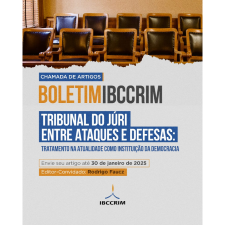The extent of judicial control on the ratification of criminal nonprosecution agreements
Views: 21DOI:
https://doi.org/10.5281/zenodo.13380606Keywords:
ANPP., guaranteeism, criminal procedure, criminal judgeAbstract
After four years of Law 13,964/19, some controversies regarding the criminal nonprosecution agreement persist. The present paper investigates the extent of judicial control on the moment of the ratification of the concluded agreement, based on a constitutional and international reading of legal norms and on the methodological perspective of criminal guaranteeism. Three fundamental aspects are highlighted for the judge’s acting: control over the charges’ admissibility (including probable cause), control over the confession’s voluntariness and control over the agreed conditions’ proportionality.
Downloads
References
BADARÓ, Gustavo Henrique. Processo penal. 3. ed. São Paulo: Revista dos Tribunais, 2015.
BRASIL. Decreto-lei nº 3.689, de 3 de outubro de 1941. Código de Processo Penal. Rio de Janeiro: Presidência da República, 1941. Disponível em: http://www.planalto.gov.br/ccivil_03/decreto-lei/del3689.htm. Acesso em: 2 maio 2024.
BRASIL. Superior Tribunal de Justiça. 6ª Turma. Agravo Regimental no Recurso Ordinário em Habeas Corpus n.º 174.870/SP. Relator: Min. Rogério Schietti Cruz. Julgado em: 11 mar. 2024. Disponível em: https://scon.stj.jus.br/SCON/GetInteiroTeorDoAcordao?num_registro=202204030705&dt_publicacao=15/03/2024. Acesso em: 2 maio 2024.
BRASIL. Supremo Tribunal Federal. Plenário. Ata de julgamento parcial no Habeas Corpus n.º 185.913/DF. Relator: Ministro Gilmar Mendes. 25 set. 2023. Disponível em: https://portal.stf.jus.br/processos/detalhe.asp?incidente=5917032. Acesso em: 2 maio 2024.
CONSELHO NACIONAL DE JUSTIÇA. Fortalecendo vias para as alternativas penais: um levantamento nacional da aplicação do Acordo de não Persecução Penal no Brasil. Brasília: CNJ, 2023. Disponível em: https://www.cnj.jus.br/wp-content/uploads/2023/09/lancamento-levantamento-anpp-1.pdf. Acesso em: 2 maio 2024.
FERRAJOLI, Luigi. Direito e razão: teoria do garantismo penal. São Paulo: Revista dos Tribunais, 2002.
GODOY, Guilherme Augusto Souza; DELMANTO, Fabio Machado de Almeida; MACHADO, Amanda Castro. A justiça restaurativa e o acordo de não persecução penal. Boletim IBCCRIM, São Paulo, v. 28, n. 330, p. 4-7, 2020. Disponível em: https://publicacoes.ibccrim.org.br/index.php/boletim_1993/article/view/515. Acesso em: 13 jul. 2024.
LOPES JR., Aury. Direito Processual Penal. 21. ed. São Paulo: Saraiva Jur, 2024.
MAGNO, Patricia Carlos; CARVALHO, Leonardo Furtado. Por uma detração compensatória enquanto dispositivo de uma política criminal redutora de danos. Revista Brasileira de Políticas Públicas, Brasília, v. 13, n. 1, p. 130-158, abr. 2023. Disponível em: https://www.publicacoesacademicas.uniceub.br/RBPP/article/view/8832. Acesso em: 13 jul. 2024.
OLIVEIRA, Marcus Vinícius Amorim de; SOUZA, Rickelly Kelman Pereira de. Participação do membro do Ministério Público na audiência de homologação de acordo de não persecução penal. Revista Acadêmica da Escola Superior do Ministério Público do Estado do Ceará, Fortaleza, v. 14, n. 1, p. 119-140, jan./jul. 2022. https://doi.org/10.54275/raesmpce.v14i01.215
VASCONCELLOS, Vinicius Gomes de. Barganha e justiça criminal negocial: análise das tendências de expansão dos espaços de consenso no processo penal brasileiro. Dissertação (Mestrado em Ciências Criminais) – Pontifícia Universidade Católica do Rio Grande do Sul, Porto Alegre, 2014. Disponível em: https://repositorio.pucrs.br/dspace/handle/10923/6943. Acesso em: 13 jul. 2024.
ZAFFARONI, Eugenio Raul; BATISTA, Nilo; ALAGIA, Alejandro; SLOKAR, Alejandro. Direito Penal Brasileiro: teoria geral do direito penal. 4. ed. v. 1. Rio de Janeiro: Revan, 2011.
ZIEHE, Juliana Menescal da Silva; MADURO, Flávio Mirza. A (im)prescindibilidade da confissão para a propositura do acordo de não persecução penal. Revista Eletrônica de Direito Processual, Rio de Janeiro, v. 23, n. 2, p. 689-707, maio/ago. 2022. https://doi.org/10.12957/redp.2022.63387
Downloads
Published
How to Cite
Issue
Section
License

This work is licensed under a Creative Commons Attribution-NonCommercial 4.0 International License.
Copyright of published articles belongs to the author, but with journal rights over the first publication and respecting the one-year exclusivity period. Authors may only use the same results in other publications by clearly indicating this journal as the medium of the original publication. If there is no such indication, it will be considered a situation of self-plagiarism.
Therefore, the reproduction, total or partial, of the articles published here is subject to the express mention of the origin of its publication in this journal, citing the volume and number of this publication. For legal purposes, the source of the original publication must be consigned, in addition to the DOI link for cross-reference (if any).

 Português (Brasil)
Português (Brasil)
 English
English
 Español (España)
Español (España)











